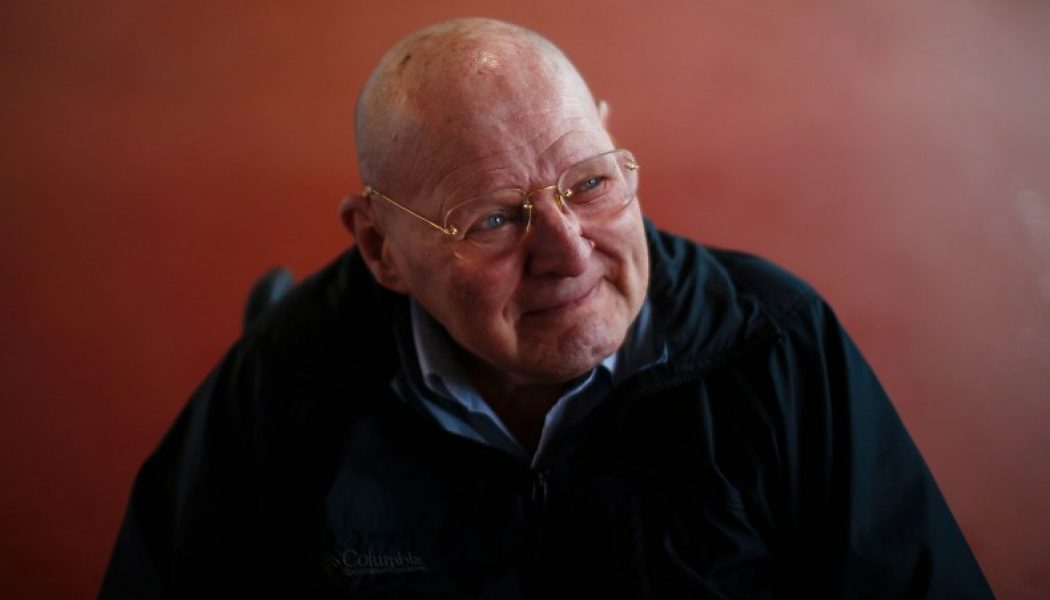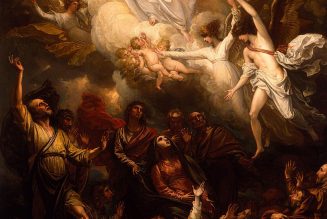
The superstar Vatican Latinist, a contrarian monk and the common man’s common man, made it his mission to revive the Church’s official language.
‘Latin does not allow you to drift on meaninglessly,” Reginald Foster told E. J. Dionne in 1986, explaining why it deserves to live. In Latin, “either you say something” in “concrete language” or “you stop.” Foster overstated the case, but let’s be charitable. He was talking to a journalist. He had reason to think he should paint with a broad brush.
We anglophones tend to ignore the imagery buried inside the etymologies of words we use to express abstract concepts. We notice it more in Latin. That may be in part because we look at the foreign language with fresher eyes than we have for our native tongue. Also, Latin has a small vocabulary and stock of idioms. Its common words and phrases do an awful lot of double duty, helping to convey lofty ideas before returning to the mundane work of enabling people to exchange information about the grain harvest or the price of eggs. You remember Cincinnatus, who bounces from his farm to high office in the capital and then back again. At heart, Latin is a language for the practical and the plainspoken.
That characterization of it is a caricature but apt enough. You may recognize the truth in it. It’s a commonplace among teachers and students of classics. Foster personified it and, in the process, humility (humilis: of the earth, grounded), a Christian virtue. The Carmelite monk and superstar Latinist from Milwaukee was the loyal son, nephew, and brother of plumbers. On the job, he dressed as they would on their jobs. He bought his workman’s clothes from Sears, some sources say; others, from J. C. Penney, beatae memoriae.
No doubt the traditional tunic and mantle of his mendicant religious order met some standard of austerity when they were adopted in the Middle Ages. In the modern Western world that Foster moved in, though, they were exotic. They connoted prestige and some mysterious privilege, so he forwent them. Surely they cost more than his jumpsuit and windbreaker. I worked briefly with a Franciscan friar, the CEO of a small nonprofit, who preferred a polyester short-sleeve collared shirt to the brown tunic and rope belt that were the emblem of his order. He commented once in passing that the price of the whole habit was in the three figures. Someone asked him what Saint Francis would want the brothers to wear if he were founding the order today. “A T-shirt and jeans.”
Around 1990, a classmate returned from a semester in Rome and told me about a strange and remarkable Vatican Latinist she’d encountered. He might have been insane, she thought, but she was sure he was brilliant. He was one of the few people anywhere who spoke the language fluently. It was the first I’d heard of Reginald Foster. She marveled at his worker’s jumpsuit.
For nearly 40 years, beginning in 1970, he taught Latin in Rome, at “the Greg,” the Pontifical Gregorian University, the jewel of Jesuit higher education. He added a summer course, gratis, in 1985. His day job during most of that period was with the Secretariat of State at the Vatican, in the Office of Latin Letters. There he composed documents in the official language of the Catholic Church and translated oceans of modern Italian into classical Italian, as it were. He wrote the text for the Vatican’s ATM screens in Latin. He was dismissed from the Greg in 2006 for — he’d made it a practice — teaching students who dodged the tuition.
A different classmate told me that Foster was a Marxist. That may be too precise a term for the bundle of his political sympathies. Like much of the Roman Curia, he stood to the left on economics but was no economist. Unlike much of the Curia, he was an egalitarian in fact, not just theory. He joked about his circumstances. The irony of his employment amid so much marble opulence seems not to have been lost on him.
He leavened his swipes at the institutional Church by sprinkling them with a certain mirth. I wonder whether he learned it from Jesuits at the Greg. John McLaughlin, the TV host and commentator, exemplified the style: Raise the severity of your tone and rhetoric so high that people laugh. The trick is to keep a straight face but somehow telegraph that the pose of the irate taskmaster is for comic effect, even if you’re serious about the substance of the words that you spit out in your mock dudgeon. McLaughlin had been with the Jesuits for 28 years. It may be that he started out playing the character but then became it. I was never sure. A Jesuit theology teacher at my high school pitched it just about right: Now and then, but not often, he let the mask slip enough to show some hint of a smile. If you weren’t there, you heard about it.
The legend of the contrarian genius haunting the Latin Letters office in the shadow of St. Peter’s Basilica reminds me also of Norman Mailer, who called himself a “Left conservative,” a label that Foster could have worn as honestly as any other. Taken on his own terms, Foster made sense, although his various loves and hates didn’t add up, unless you gave up trying to squeeze them into ideological categories. He venerated Cicero, the Ted Williams of prose stylists, but wait. What would that champion of the Optimates, the party of anti-populist conservative aristocrats, have made of Foster’s identification with the proletarii (whose literal meaning, “producing offspring,” would have excluded the celibate priest who was Father Foster)?
Married though he was to the Latin language, the learned monk was fine with Mass in the vernacular. He kept his distance from Catholic traditionalists. At the same time, he criticized John Paul II for neglecting to cultivate in the Church — and in toto orbe terrarum, for that matter — a greater understanding and appreciation of Latinitas. The breach, as Foster saw it, of the papal duty to teach was inexcusable. In its formative years, the soul of the Catholic Church, like that of Rome and its empire, was conformed forever to the shape of its lingua franca. Whoever wants to know the heart and mind of Catholicism or of Western civilization had better learn Latin.
About John Paul and Latin, Foster and a remnant of hardcore traditionalists agreed, although both sides might have preferred not to notice. In the wider world, John Paul came to be regarded as a conservative giant who stood athwart “the spirit of Vatican II” (the loosey-goosier interpretations of the Second Vatican Council) and made it stop. He remains revered on the right, by and large. On the left, he elicits responses ranging from polite respect to exasperation and outright hostility. Here’s a twist: Some radical traditionalists to the right of mainstream conservatives despise John Paul no less than his harshest detractors on the far left do — horseshoe theory — though for different reasons. The rad trads of course deplore his relaxed approach to liturgy but also his blessing and normalization of the formal doctrinal agenda of the Second Vatican Council, especially as expounded in the constitutions on interfaith dialogue (Nostra Aetate) and religious liberty (Dignitatis Humanae).
“The Church addresses people with full respect for their freedom,” John Paul wrote in 1990, affirming the council. “Her mission does not restrict freedom but rather promotes it. The Church proposes; she imposes nothing. She respects individuals and cultures, and she honors the sanctuary of conscience.” That complicates matters for the Catholic who in his political philosophy sides with the integralists, many of whom in their liturgical sensibility identify as traditionalists; neither community is large, but both are vocal and motivated, and they overlap.
Foster had no use for any such faction. He had no patience for complaints from the opposite camp, either, where Latin was scorned as elitist, an obstacle between people and priest. Look, everyone who acquires the language does so in the same way: People learn it. Why don’t you? “You do not need to be mentally excellent to know Latin,” Foster insisted. “Prostitutes, beggars, and pimps in Rome spoke Latin, so there must be some hope for us.” (Not that a Roman lowlife was necessarily dim, but you get the idea.) As for the hoary assumption that princes of the Church whisper secrets to one another in a dead language, above our heads, please. Latin instruction in seminaries has been neglected for generations. The linguae francae (note the plural) of the Church in the 21st century are Italian and more Italian, French and Spanish, English and German. Among the many missives that Foster at his desk in the Apostolic Palace penned in the language of Cicero (and — mark you, snob — of the Roman masses) were congratulatory greetings that his office sent to high-ranking churchmen. He said that the notes were sometimes returned and accompanied by requests for translations.
He thought that the pope, who could lead by example, should set aside a couple of hours every day, 2 to 4 p.m., for reading in Latin — forget the siesta. He suggested that the Holy Father “stand up at the United Nations and speak Latin and say, ‘If you don’t understand this, it’s too bad, jack!’” Foster’s mission to revive Latin as a spoken language has been left to his followers. Was he quixotic? Or a pioneer? Wait at least a century or two before answering. The Church lives by a slow clock. Imagine the reaction if you could visit the 19th century and you described for its inhabitants the extent of modern Hebrew, a forerunner, Deo volente, of Latin redivivus. These dry bones will live again.
Foster urged his students at the Greg to “pass on this flame.” After the school booted him, he founded an academy for Latin learning in central Rome. In 2010, after he fell ill and returned to Milwaukee, former students of his founded the Paideia Institute, dedicated to the classical humanities, with emphasis on instruction in Latin and Greek. With Daniel P. McCarthy, a Benedictine monk in Kansas, he wrote The Mere Bones of Latin according to the Thought and System of Reginald (2015). Or, if you like, Ossa Latinitatis sola ad mentem Reginaldi rationemque. Reggie, as he wanted you to call him, taught Latin to all comers in the basement of the nursing home where he lived his final years. Classes were free, in keeping with his principle. Never put a price on the priceless. He was diagnosed with COVID-19 in December and died on Christmas Day, anno Domini 2020. He was 81. Euge serve bone, et fidelis. Intra in gaudium Domini tui (Matt. 25:23). Requiescas in pace.
Join Our Telegram Group : Salvation & Prosperity







